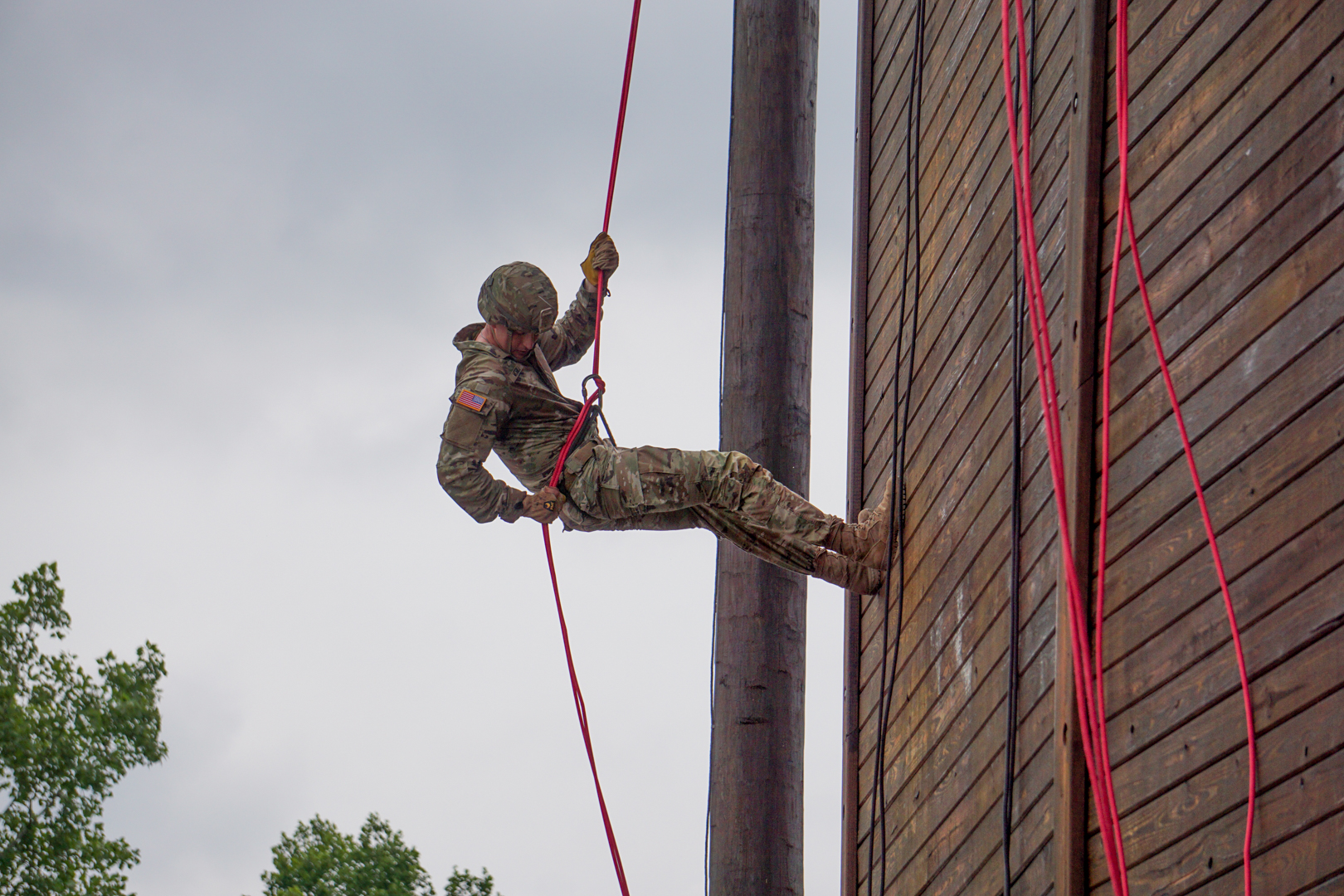By: Madison Thompson
FORT KNOX, Ky. – 1st Regiment, Advanced Camp, arrived at Smith Gym, June 22, for Platoon photos. Cadet Summer Training is centered around the Cadets and creation of future leaders by making graduates into 2nd lieutenants.
With their training almost complete, there are very few things left for them to complete. There is one thing, however, that was done that was centered around helping others; the donation of blood.
The Armed Services Blood Program held the first CST blood drive, June 22. The ASBP set up everything required in Smith Gym including chairs, interview stations, recovery stations and bag distribution. They also provided snacks and sugary drinks to replenish the blood sugar levels of the donors.

1st Regiment, Advanced Camp ASBP Blood Drive
ASBP Blood Drive, Advanced Camp, 1st Regiment. Cadets preparing to interview prior to donating blood. Photo by: Madison Thompson
Before Cadets are permitted to donate, however, they are required to fill out paperwork to verify they are healthy candidates.
“If you had tick bites, tattoos, or piercings other than your ears you can’t donate,” explained Cadet Colton Francemome, Syracuse University, Solvay, N.Y. Having an infection because of any of the above mentioned could be grounds for inability to donate.
Lab Technician Milagros Montalvo explained the process after Cadets complete paperwork.
“After they fill out the paperwork, their next station is going to be the interview. So, they’re going to get interviewed on the paperwork they filled out. If they pass their interview inspection after their questions, they’re going to straight to bag issue. They’re going to get assigned a bag. … We’re going to make sure they’re all good before we draw them. Then they’re going to get sent to a phlebotomist. After their blood draw is complete, they’ll be sent to recovery for about five to ten minutes.”
The donation time varies from person to person, but the amount, one pint, is always the same. Whole blood donations, as well as any donations, are very important for many reasons. Each reason is different depending on the person.

ASBP Blood Drive, Advanced Camp, 1st Regiment. 2nd Lt. Stephen Yonke, Wheaton College, Dekalb, Ill. donating blood. Photo by: Madison Thompson
“People need blood. Soldiers need blood. I feel like there’s no reason not to,” said Cadet Joseph Bentley, Marquette University, Seattle, Wash. Prior to this event, Bentley had donated ten times. His advice for future donors is, “Just relax and don’t look at the needle.”
“Because we’re just coming into the Military now and, being part of the Military, you’re part of a brotherhood and the family that goes throughout your entire career. Generally, you’ll die for anyone else in the same uniform as you,” said Francemome. “So, it’s your first chance in your Military career just to give a little bit to someone you’ll never meet just because they’re wearing the same uniform as you. They might need it someday. Someday, who knows, I might need it from somebody just like me who was willing to help out.”
“It’s important to me because I do have family members in the Military and I did have a family member in need of blood while they were away … I really see how it helps a lot of Soldiers. Giving blood, helping them recuperate faster, and I just think it’s for a good cause,” said Cadet Brianna Best, Towson University, Baltimore, Maryland.
Even though it was Best’s first time donating, she stated that, “It was good, unique and interesting. I enjoyed doing it for a good cause. That’s what gave me the motivation to do it because, usually, I stay away from needles.”

ASBP Blood Drive, Advanced Camp, 1st Regiment. Lab Technician Milagros Montalvo. Photo by: Madison Thompson
The Lab Technicians also acknowledged that everyone has a different reason, but the selfless donations serve more purpose than meets the eye.
“This is important because this is for a bigger cause. This is for the Military …So, it’s bigger than all of these Cadets, but they don’t know it’s bigger than themselves. It goes to families, it goes to hospitals, it goes to the VA … It’s a big mission. It’s for a good cause and it’s for their brothers and sisters,” said Montalvo.
Through the great turnout, June 22, there are still things that can be done. At the end, these words were left for everyone.
“If they feel like they should do something great for the U.S. Army, this is one way to show your support,” said Best.
Cadet Summer Training brings 8,200 Cadets through Basic and Advanced Camp this summer on Fort Knox. These camps are designed to help challenge, grow and improve various skills and leadership qualities within the Cadets. If you think you have what it takes to be a Cadet or if you are interested in a job after college click the following link: https://my.goarmy.com/info/rotc1/index.jsp?iom=IP08-AUTO-R1NA-BR-XXX-XX-XXX-MO-XX-X-BRCMAC:IP08




